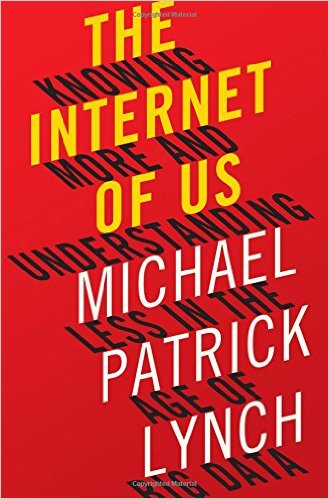
Patrick Lynch worries that while our supply of available information grows, our wisdom in using it is lagging behind. Lynch believes that as people access the Internet more and more, they are becoming more “tribal.” People tend to read blogs they agree with. They tend to ignore information sources they don’t agree with. This helps explain the increasing polarization of American society, but this is also becoming a world-wide phenomenon. Lynch provides plenty of examples of how GOOGLE is manipulated so certain web sites come up first in a search. I found The Internet of Us to be a thought-provoking book. GRADE: B+
TABLE OF CONTENTS:
Preface
PART I: The New Old Problems of Knowledge
1. Our Digital Form of Life
2. GoogleKnowing
3. Fragmented Reasons: Is the Internet Making Us Less Reasonable?
4. Truth, Lies, and Social Media
Part II: How We Know
5. Who Wants to Know: Privacy and Autonomy
6. Who Wants to Know: Crowds, Clouds, and Networks
7. Who Gets to Know: The Political Economy of Knowledge
8. Understanding and the Digital Human
9. The Internet of
Acknowledgments
Bibliography
Index
What I find happening with my own children is that, while RETRIEVAL of data is as easy as a mouse click, ATTAINMENT of knowledge (something far more precious and difficult) does not necessarily follow. They can find the exact facts they’re looking for, but context doesn’t really interest them.
When I was on my early teens, I went through a phase where I was obsessed with the family trees of European royal families, especially in the Middle Ages and Renaissance. I would pore over history books looking for who married who, who was the child of who, how this one was related to that one, etc. My goal was to fill in my family trees notebooks (which I still have–looking back, I guess I was an, um, unusual child), but what I didn’t realize was that in reading all those books to find family trees, I also came to understand a lot of history from the bubonic plague to the crusades to the reformation to the growth of guilds. Searching for one thing, I found something else. Today, I can click on one link and get every royal family tree going back to Uther Pendragon…but there’s no context at all. That’s what’s being lost.
/Sad soapbox dismount.
Deb, we have more and more data, but it can be hard to find what you want. Patrick Lynch describes a crowded house full of stuff (and more stuff arrives every day) where coming up with that one item (information) gets harder and harder. As you suggest, it’s easy to get lost in the Fun House.
That is very true. We were watching the last season of PERSON OF INTEREST, where an “intelligent” super computer helps the heroes “save” people and thwart crime. Since the evil super computer Samaritan has taken over, however, things have gotten worse. They brought the Machine back online but what is missing now is the context. It may tell them someone killed someone else, but not who they are, what the circumstances were, why it happened, etc. The machine actually sends a hit woman after one of the heroes because he is a “killer” in its estimation.
Anyway, just struck me that there are parallels to what the book is saying.
PS – Deb, I made family trees too! I started with Queen Victoria’s children and everyone coming from that tree.
Jeff, that computer scenario is absolutely plausible. Patrick worked on our family tree. I told him, that we’re all descended from Kings and Queens!
I agree with Deb even in terms of myself. I look up the same info again and again-especially in terms of addresses and how to get there. Because I know it is available online I don’t take it in. Maybe I wouldn’t have anyway, but still
Patti, Albert Einstein was once asked for his phone number. Einstein picked up a phone book and looked it up. When the questioner asked Einstein why he didn’t know his phone number, Einstein replied, “I have better things to put in my brain.”
I remember similar arguments that television gave only “canned” information, and interaction with real world sources of knowledge such as books and newspapers would suffer. I think that’s been true, and this is the next, bigger step in a process that leaves people with fact bits instead of knowledge.
Rick, I love your “fact bits instead of knowledge” observation. We’re living in a more fractured culture.